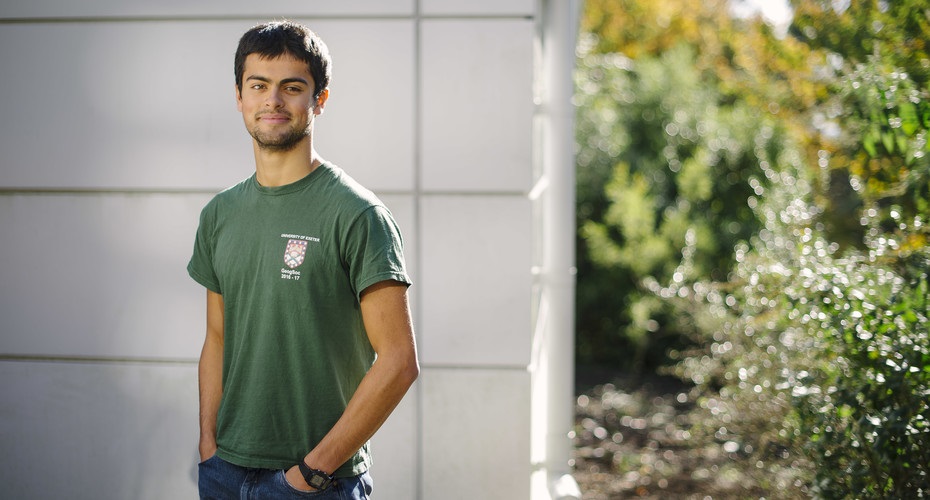| Degrees |
|
|---|---|
| Duration |
| Start date | September or January |
|---|---|
| Location | Streatham Campus |
| Study modes | Full time or part time |
Overview
Researchers in Modern Languages and Cultures are actively engaged in projects across a broad range of subjects, including linguistics and translation studies, film, visual arts, and literary culture.
Our research-active academic staff, supported by a team of language teachers which includes native-speaker teachers, are highly successful in winning prestigious research awards from funding bodies including the AHRC, British Academy, EU, Leverhulme, and Marie-Curie.
Contact
Web: Enquire online
Phone: 0300 555 6060 (UK)
+44 (0)1392 723044 (non-UK)
![]()
Supervised by published translators and experienced practitioners, plus specialists in the use of machine translation and computer-assisted translation tools
![]()
100% of our Modern Languages and Linguistics research has internationally excellent impact
Based on research impact rated 4* and 3* in REF 2021
![]()
Top 150 in world subject rankings for Modern Languages
QS World University Subject Rankings 2024
![]()
Top 10 in UK subject rankings for Modern Languages
The Complete University Guide 2025
Research overview
The ‘Centre for Translating Cultures’ provides a focal point for research in Modern Languages. Our postgraduate students regularly present work in progress at the Centre and participate its regular series of seminars often with distinguished visiting speakers. Modern Languages postgraduates are also active in other research centres in Modern Languages and the College of Humanities.
Beyond the University we have good relations with UK museums and galleries, as well as academic and research institutions internationally, attracting research students from all over the world and many cultural backgrounds.
There are frequent public seminars and lecture series which feature distinguished scholars and public figures in related fields from the UK, Europe and throughout the world.
- Chinese art and culture and European exchanges, 17th-18th centuries
- Chinese literature in translation
- Chinese modern intellectual history
- 19th-20th-century history of international relations
Visit our Chinese staff profiles for more information about individual research interests.
- Literature and culture – Middle Ages to the present day
- French cinema
- French linguistics
Visit our French staff profiles for more information about individual research interests.
- 18th- and 19th-century cultural and literary studies
- Culture of the Weimar Republic
- Museum studies and memory studies
Visit our German staff profiles for more information about individual research interests.
- Iberian and Latin American literature and history of ideas (19th-21st centuries)
- Spanish and Latin American cinema and visual culture
- Gender studies and women's studies
Visit our Hispanic Studies staff profiles for more information about individual research interests.
- Modern Italian literature
- Italian linguistics, including multilingualism in immigrant communities
- Italian cinema
Visit our Italian staff profiles for more information about individual research interests.
- Postcolonial, feminist and cultural studies in Portuguese-speaking contexts.
- Portuguese linguistics: language contact, variation and change; cognitive linguistics and construction grammar.
Visit our Portuguese staff profiles for more information about individual research interests.
- Literature and culture of the 20th century, including translation
- 19th and 20th century poetry
- Comparative literature
Visit our Russian staff profiles for more information about individual research interests.
- Literary translation and adaptation
- Translation in history
- Translation, rhetoric, and philosophy
- The sociology of translation (agency, brand, networks)
- Translation and multimodality / intermediality / the visual
- Translation and cityscapes
- Translation and migration / mobility
- Translation and area studies (e.g. gender studies; postcolonial studies; cultural studies; urban studies; medieval studies)
How to apply
Entry requirements
MA by Research Modern Languages
Students applying to enter directly into the MA by Research programme would normally be expected to have a BA degree with 2.1 or equivalent in Modern Languages or related subject or other relevant qualifications such as a doctorate in another subject.
MPhil/PhD
Chinese Studies
Normally students will have proficiency in Chinese (good command of written and spoken Chinese), a good UK Honours degree (2:1 Honours or international equivalent) and a Master’s degree with Merit or international equivalent in a related subject.
French Studies
Students applying to enter directly into the MPhil/PhD programme would normally be expected to have a Masters degree with Merit or equivalent in French Studies, or other relevant qualifications such as a doctorate in another subject.
German Studies
Students applying to enter directly into the MPhil/PhD programme would normally be expected to have a Masters degree with Merit or equivalent in German Studies, or other relevant qualifications such as a doctorate in another subject.
Hispanic Studies
Students applying to enter directly into the MPhil/PhD programme would normally be expected to have a Masters degree with Merit or equivalent in Hispanic Studies, or other relevant qualifications such as a doctorate in another subject.
Italian Studies
Students applying to enter directly into the MPhil/PhD programme would normally be expected to have a Masters degree with Merit or equivalent in Italian Studies, or other relevant qualifications such as a doctorate in another subject.
Lusophone Studies
Normally students have proficiency in Portuguese (good command of written and spoken Portuguese), a good UK Honours degree (2:1 Honours or international equivalent) and a Master’s degree with Merit or international equivalent in a related subject.
Russian Studies
Students applying to enter directly into the MPhil/PhD programme would normally be expected to have a Masters degree with Merit or equivalent in Russian Studies, or other relevant qualifications such as a doctorate in another subject.
Interdisciplinary Studies/Translation Studies
Students applying to enter directly into the MPhil/PhD programme would normally be expected to have a Masters degree with Merit or equivalent in Modern Languages (in particular French, German, Italian, Russian or Spanish) or Translation studies, or other relevant qualifications such as a doctorate in another subject.
Requirements for international students
If you are an international student, please visit our international equivalency pages to enable you to see if your existing academic qualifications meet our entry requirements.
English language requirements
International students need to show they have the required level of English language to study this course. The required test scores for this course fall under Profile E: view the required test scores and equivalencies from your country.
PhD and Research Programme application process
The information below applies to self-funded PhD, MPhil and Masters by Research applicants, but if you are applying for a funded PhD studentship, please follow the specific instructions related to that application.
- Pinpoint your PhD research area
- Investigate whether this area is available at Exeter
- Ensure that you meet our English language entry requirements (international students only)
- Construct and refine your PhD research proposal
- Approach your potential supervisor(s)
- Apply online
PhD studentships pages can be accessed in our Funding lists on Finance tabs under each research topic page, and are also available from the Postgraduate Research search results pages on this site, on the PhD projects tab.
Full details of the application process can be found on our Apply now webpage.
Fees and funding
Tuition fees per year 2024/25
- Home: £4,786 full-time; £pro-rata part-time
- International: £22,600 full-time
For those studying for more than one year, our fees are expected to increase modestly in line with Consumer Price Inflation measured in December each year. More information can be found on our Student Finance webpages.
Tuition Fees per year 2023/24
- Home: £4,712 full-time; £pro-rara part-time
- International: £20,500 full-time
For those studying for more than one year, our fees are expected to increase modestly in line with Consumer Price Inflation measured in December each year. More information can be found on our Student Finance webpages.
Our Postgraduate Funding webpage provides links to further information. If you are considering a PhD in the future, in addition to University of Exeter funding, we have been successful at securing postgraduate funding for PhD research through our Funded centres.
Current available funding
Supervision
You can expect:
- High-quality research supervision to develop and nurture your potential
- A tailored supervision approach to help best suit your requirements
- Accessible supervisors who are enthusiastic about working directly with postgraduate research students
- Regular timetabled meetings with your supervisor
- 'Open door' policy to all postgraduate students - instant access to world-leading researchers who will share their expertise and ideas with you
- Regular meetings with your supervisory team, other members of your research group, and mentors
› Modern Languages staff profiles
You will only be able to pursue a research degree with us if we can offer appropriate supervision. Your supervisors will provide the necessary support and guidance and so need to have expertise in your chosen research field. You may join a research team or work with specific members of staff.
We strongly recommend that you informally approach your potential supervisor(s) with your research proposal before submitting a formal application to study. This will enable you to find out if they feel they would be able to supervise you and whether they believe your research proposal needs further refinement.
Visit our how to apply page for detailed information on the application process.
Facilities
We provide access to excellent computing facilities and training is provided in a broad range of academic and general professional skills, such as compiling a CV, interview skills and time management.
Based in the Queen’s Building, you will benefit from a dedicated postgraduate IT suite and lounge, as well as a postgraduate and staff common room. There is also a study room containing a number of private study carrels for research students.
Computing facilities include a state-of-the art suite dedicated to Translation Studies with the latest in CAT tools, and a bespoke lounge for postgraduate students in Translation Studies.
Careers
We are committed to making your PhD a rewarding experience that will develop your skills and expertise. Undertaking a postgraduate degree with us also provides you with access to the wide range of support offered by our Career Zone.
Postgraduate research students can access our Postgraduate Researcher Development Programme, which covers a range of topics to help you complete a successful research degree and acts as a springboard for your research career.
Graduate destinations
Below are some examples of initial employment titles and employers of Modern Languages postgraduates who have studied with us in recent years.
Please note that, due to data protection, the job titles and organisations are listed independently and do not necessarily correspond.
| Job title | Organisation |
|---|---|
| Associate lecturer Associate lecturer in French Associate Lecturer in French in Education and Scholarships Associate Research Fellow Content Designer Freelance Proofreader and Translator French teacher French teacher Grammar School Teacher Independent Quality Evaluator Italian Teacher Lecturer in French Studies Post Doctorial Researcher Recruitment and marketing assistant Reporter & Producer Self-Employed Translator Spanish Lecturer Teacher and Honorary Research Associate Teacher/Researcher University of Exeter Visiting Lecturer in Media and Cultural Studies Work Placement Coordinator |
Alliance Française Devon Antenna International Baylis Court School BPA Quality Hoheretechnische Kennet School Language Advanced Middlesex University National Public Radio, USA Uni of Exeter University of Poitiers University of Portsmouth |











